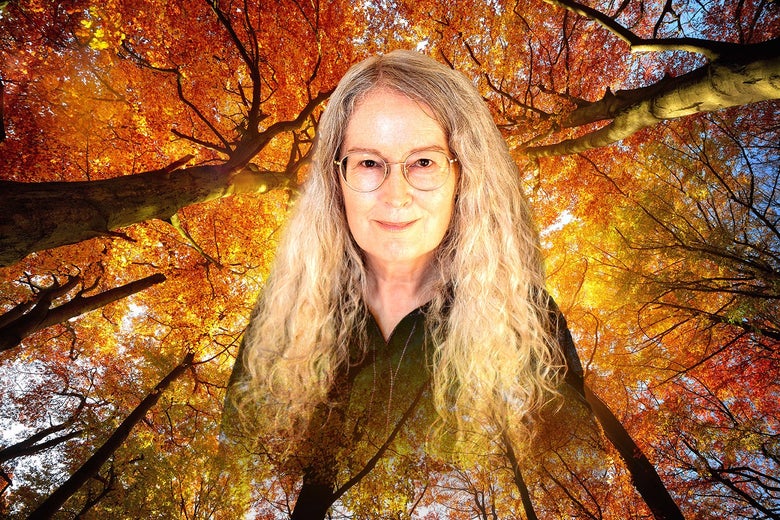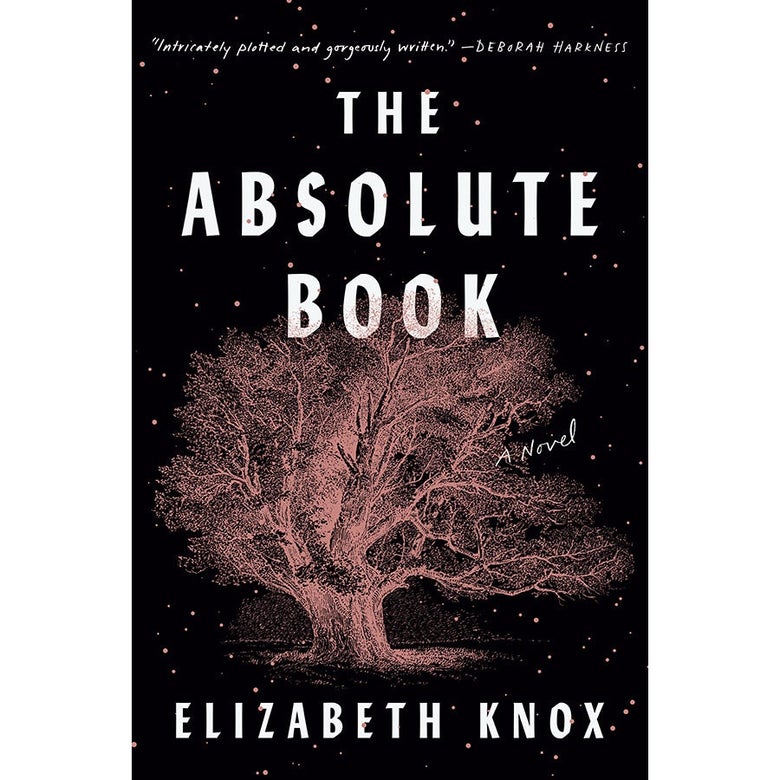
Slate has relationships with various online retailers.
If you buy something through our links,
Slate may earn an affiliate commission.
We update links when possible,
but note that deals can expire and all prices are subject to change.
All prices were up to date at the time of publication.
In January 2020, I wrote for Slate about the experience of reading The Absolute Book, an epic fantasy by the Wellington, New Zealand writer Elizabeth Knox. The book seemed so remarkable—and so marketable—that I couldn’t believe it had no American publisher, so I gave my piece the puckish headline “This New Zealand Fantasy Masterpiece Needs to Be Published in America, Like, Now.” Much to my delight, the essay worked, and on Tuesday the American edition of The Absolute Book lands on our shores as one of the most exciting books of the season.
The Absolute Book is a brainy, propulsive adventure, following a British author, Taryn Cornick, who finds a way to enact her fantasies of revenge on the killer of her sister. But that act has consequences not only for her but for the many worlds she soon learns are watching—the fairy world, the world of the gods, the world of lost souls. It’s a wrenching, sweeping novel, one I haven’t stopped thinking about in the year since I first read it. I talked to Elizabeth Knox about epic fantasy, writing about revenge, and her close encounter with Peter Jackson. Our conversation has been edited and condensed.
Dan Kois: You’re a writer with a lot of books under your belt for adults and for teens. What made you turn to something this epic at this stage, in your career?
Elizabeth Knox: First of all, I was looking for a place to put certain kinds of feelings. And I’d had some very bad years where my mother had ALS—motor neurone disease, which is what we say here. And my husband’s brother was killed, deliberately, leaving behind four children and a wife. And we were looking after people, and it was very tiring, the strictures of responsibility. So when some of that passed off and we were kind of freer again, I had this wonderful feeling of coming back to life, and I kind of wanted to do something with that.
So I was feeling that I was going to write something that was ultimately joyous, but also big, you know. But I didn’t have a way in. And then I started thinking about the kinds of books that I really like, bookish books, where we have groups of people looking for something.
You call those books “arcane thrillers.”
There are ones that do go over into fantasy—like Kate Mosse’s Labyrinth has time-travel—but The Da Vinci Code is basically like a scholarly thriller. I thought, well, that’s my framework. And it became epic because I decided I wasn’t going to make it a book that didn’t turn out to be fantastic, and have all these roots in other worlds. So then, it just opened up and opened up from there.
So it wasn’t that the cosmology was clear in your head as you started, but instead you found each new level as you wrote.
Partly, but also, I decided very early on that it was going to be an animist and pagan book, you know. Where it had gods in it, and the gods were subject to rises and falls according to their worshippers.
I’m so intrigued to hear you say that what you were first looking for was a framework for feelings of freedom. But the book also is wrestling with that dark period you came out of. That’s the whole story of Taryn and her sister.
Yes, well, grief and loss. The story of the woman who isn’t satisfied with the fact that her sister’s murderer in fact has to be tried for manslaughter because you can’t prove intent—that’s the story of my brother-in-law. The man went to prison for manslaughter, because it was impossible to prove intent. So he wasn’t tried for murder, but in effect, the … the spite and carelessness of the act was murderous.
I wasn’t thinking vengefully because I can’t look at a prison—which we did, it’s on Rarotonga—you can’t look at the outside of a prison without feeling pity for everybody who ends up there. But then I decided to imagine somebody who took a completely different attitude. Taryn can’t let go.
Well, and circumstance gives her the chance for revenge. Fate presents her with a man who is able to do something about it.
Yes, that’s right. It’s like the classic temptation story. She’s presented with a chance to accomplish her revenge. She refuses to think about the cost to herself, and to the man who does it for her.
I really love a somewhat minor subplot in the book—Taryn’s father, the movie actor who has had roles in what are clearly the Lord of the Rings movies, going back to Wellington for what he thinks is a screen test for a new Peter Jackson project. WETA, Peter Jackson’s studio, plays a sometimes oversized role in the culture of your city. Has your writing life ever intersected with their work?
Oh, I can tell my Peter Jackson story. I saw his first movie, Bad Taste, in the film festival, and I really loved it. I mean, it’s fun, but it’s also the work of a very, very good director. And then he came into the bookshop and the museum where I was working, and my boss had been one of his helpers on the movie. He introduced me and said, “Elizabeth’s a writer.” And at that point I had just published my first novel. Peter Jackson gave me his Wingnut Films card, and said, “Do you want to write a screenplay for me?” And I said, “Oh, no, I don’t think I could do that.”
What a missed opportunity!
Well, it was very early on in both our careers.
You know, every critic, once in our lives, we want to write that piece demanding that publishers pick a book up. So when I did that, and then they actually listened, that was a real critic’s dream. But I assume it appeared very weird from your perspective. When did you know that something was happening?
Well, the phones went mad. My website wasn’t behaving, so we had to fix that very quickly. And you know, then Disney and other people are calling. Very strange.
You’ve been published outside of New Zealand and in the States plenty in the past. Why do you think it was that this particular book had not sold previously?
I didn’t try very hard. ‘Cause I’m very easily discouraged. I’m a go-away-and-write-another-book writer, which I have to get over because I’m getting too old to just keep eternally going away and writing another book. And also, it is very hard to persuade people that anyone from New Zealand has anything interesting to say.
New Zealand has dealt with the pandemic much better than the United States. Please tell me and the readers of Slate something that you’ve done in the past few days that will drive us insane with jealousy.
I had my husband’s 60th birthday party here. So my son and I cooked for 45 people in our home, and everybody kissed and hugged and none of us regarded it as peculiar.
You’re killing me.
New Zealanders come home from overseas, and it’s like they’re shellshocked, you know, when they first see people kissing and hugging. But yes, we had the QR code, so that people could scan when they came in so that everybody would know where they’ve been, because tracking and tracing is really important if you do get outbreaks.
By Elizabeth Knox. Viking.


